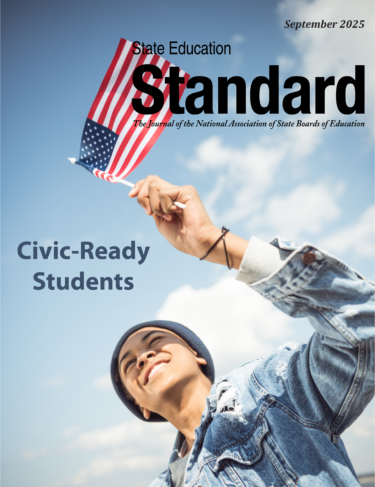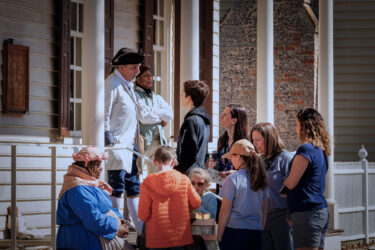September 2025
—
Volume 25, No. 4
Civic-Ready Students
Although they approach it from a variety of perspectives and suggest different actions for state boards of education, the authors in this issue of the Standard begin from the same place: the urgent need to improve and expand K-12 civics learning. They believe that more and better civics will inspire students to become better citizens, ones who will be equipped to participate, preserve, and defend America’s democracy and engage in reasoned, respectful discourse across differences. And many see high-quality civics learning as an antidote to student disengagement from both school and civic participation, as students come to see themselves as having agency and problem-solving skills.

Articles
The Challenges of Crafting Excellence in Civics and History for All
By Danielle Allen, Paul Carrese and Louise DubéThree authors of Educating for American Democracy revisit five aims depicted in their roadmap—and the miles to go.
The State of Youth Civic Engagement
By Jessica Sutter and Audra WatsonUnderstanding young people’s attitudes toward democratic participation can help states summon the resolve and the wisdom to strengthen civics learning.
Six Things State Leaders Can Do to Invigorate US Civics and History Learning
By Chester E. Finn Jr.Broad public agreement on what students ought to learn should propel their efforts, as should the lack of confidence in democratic institutions.
The Science of Experiential Civics
By Pamela Cantor MD, Fernande Raine and Susan RiversYoung people are wired for civics learning that connects them to their communities, builds their agency, and leverages relationships.
Recognizing Students and Schools for Civics Learning
By Andrea Benites, Lisa Boudreau and Shawn HealyTo boost critical knowledge and skill building, some states offer diploma seals and school recognition programs.
Preparing Students for Informed, Active Citizenship: Lessons from Illinois
By Kei Kawashima-Ginsberg and Mary Ellen DaneelsIllinois Democracy Schools are a key element of the state’s comprehensive approach.
Opinion
Alarming Achievement Data Ought to Spur Big Changes to Civics Education
By Martin R. WestState boards of education use data to drive policymaking, but achievement results related to civics are not fueling the change needed.
From Symbolic to Substantive: How DC Elevated Students as Partners in Policymaking
By Bernice Butler and Anna MayerIn Washington, DC, student involvement in policymaking is more than symbolic.
A Broader Vision for Schools’ Role in Preparing Students to Be Citizens
By Ross WienerEmbracing a broader vision means seeing school as a civic space and the everyday experience of school as an incubator of civic knowledge, skills, and commitment.
Interview with Zachary Cote: Fostering Engaged Citizens by Teaching Historical Thinking
By Zachary CoteZachary Cote explores how teaching historical thinking can support an engaged, informed citizenry that is equipped and willing to sustain a democracy.











 i
i
 i
i
 i
i